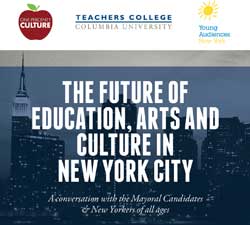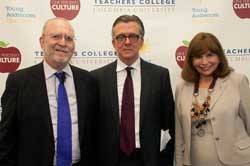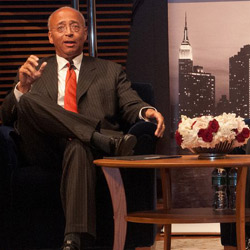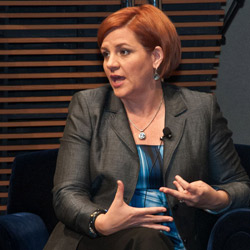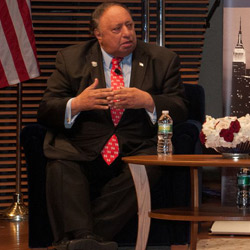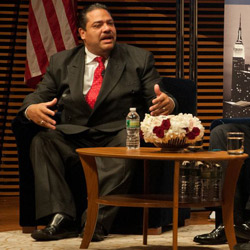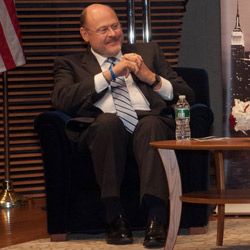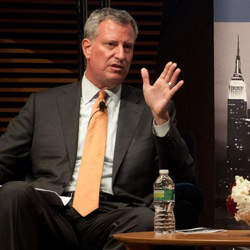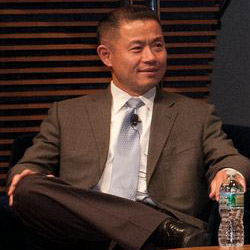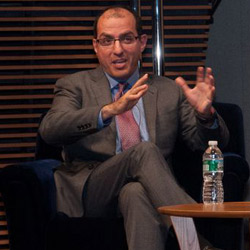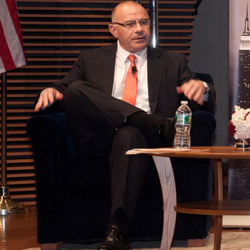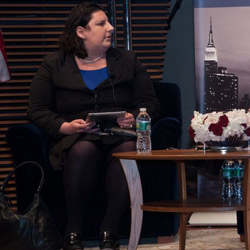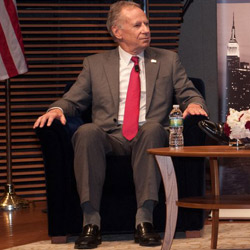Filed Under > Policy
Canvassing the Candidates
A Mayoral Forum at TC puts the arts and culture center stage
By Siddhartha Mitter
Bill Thompson reminisced on his childhood “love affair” with the American Museum of Natural History, born of school field trips. John Liu recalled studying violin and art history in public school. John Catsimatidis shared his pride in funding a theater production on Fiorello La Guardia, and Joe Lhota revealed that classical music “gets me charged up, as well as calmed down.”
The bottom line: the 14 candidates for mayor of New York who spoke at Tuesday’s forum at Teachers College on the arts and arts education all agreed that the disappearance of art and music classes from city schools must be reversed, and that current city funding of culture non-profits is not enough.
(Check out stories on WNYC.org and gothamschools.org and also see all tweets about TC’s Mayoral forum.)
When it came to specific commitments, however, the candidates, who took turns being interviewed by hosts Leonard Lopate and Kurt Andersen (both of WNYC public radio), rather than debating one another, mostly demurred. They preferred to highlight their own signature campaign initiatives, arguing that these would benefit the arts.
The forum, which TC sponsored together with Young Audiences New York and One Percent for Culture, a coalition of culture non-profits, was keyed to two glaring issues in arts education: First, that the availability of arts and music teaching in New York State schools currently falls short of the state’s mandated guidelines, and second, that – despite that shortfall – principals are allowed to apply $60 million in so-called “supplemental arts funding” to non-arts uses.
Thompson, Lhota, Liu, and Bill de Blasio agreed that the supplemental funding should be restored to core funds and no longer diverted from the arts, ideally as part of an overall increase in arts instruction to meet state rules. “We’re jaded New Yorkers, but the law is the law; it’s not optional,” said de Blasio, who is the city’s current Public Advocate.
Thompson, the former Comptroller and former President of the city’s Board of Education (since reconstituted as the Department of Education), argued that the availability of music and arts teaching should be a part of each school’s evaluation. Christine Quinn, the City Council Speaker, advocated gradually bringing a music teacher to every school, beginning with the schools where reading levels are lowest.
Both Quinn and Liu, the current Comptroller, argued that the city can pay for increases in arts and music education in part by redirecting money that the Department of Education currently spends elsewhere. Liu said the department spends about $1 billion per year on consultants, much of it, according to him, wasted. Quinn agreed that the DOE spends too much on “outside contracts for things that are not as critical” as arts education.
Liu delivered the harshest critique of the school system’s current organizational structure, advocating overall system reform to return autonomy to principals and teachers. Both Liu and entrepreneur George McDonald raised the issue of the qualifications of the schools chancellor; Liu noted that the last three chancellors did not have an education background, which he termed a violation of state law. He also decried the use of standardized test results as justification for shutting down schools.
“Our schools are not factories, our teachers are not assembly line workers, our kids are not widgets coming off those lines,” Liu said. “My plan is to achieve a system focused on learning, not test-taking.”
There were other moments when the focus veered toward broader issues in education, particularly on the subject of charter schools. Erick Salgado, the evangelical minister, pronounced himself a fan, declaring that “Parents should have a choice for their children."
George McDonald reminded listeners that “charter schools are New York City public schools” and urged leaders and policymakers to “learn lessons from all the creativity going on in school system.” He also called for the next mayor to “burst the bubble of animosity between the teachers union and the mayor.”
Other candidates advocated proposals that were not about the arts but which, they argued, would have a positive, if indirect effect on access to arts education. Salgado and Catsimatidis (a businessman) and Salgado both called for expansion of vocational and technical training, but said students in those programs should also have access to arts.
De Blasio, meanwhile, pointed to his proposal to fund early childhood education through a new tax on the wealthy. Afterschool programs, de Blasio said, are “a place where we can fundamentally reintroduce arts into the school system.”
On the separate question of city support for arts groups, candidates were asked to endorse a proposal to bring funding levels for culture non-profits to one percent of the city’s budget, which would roughly quadruple it from its current level of $150 million.
Many agreed with the spirit of the idea, but only one, minister Erick Salgado, endorsed the proposal outright, while entrepreneur Jack Hidary said, “I think we can get there,” through a greater use of public-private partnerships.
Among the major candidates, Quinn said funding levels could only be determined “in a budget context, not a political context.” She said she was proud that the City Council had fought to preserve cultural funding each year, but that it was now time to “put the arts on the offensive,” recognizing the role culture plays as an economic engine in the city.
De Blasio, too, warned that the city’s fiscal situation is complex, especially given that its major labor contracts are all open right now. Increased cultural funding, he said, was an important goal, but “we have to differentiate the aspirational piece from the next year or two.” At the same time, de Blasio said, his affordable housing initiative would have an immediate benefit for artists living in the city.
Thompson also struck a cautionary note, while pointing out that whatever funding increases are possible should include smaller cultural organizations spread across the five boroughs – a point echoed by Liu, who highlighted newer cultural groups and those that serve immigrant communities.
Among other initiatives that candidates argued would benefit arts funding, former Cty Council member Sal Albanese advocated for reform of the city’s pension funds, and Green Party candidate Tony Gronowicz stressed a Wall Street transaction tax.
Other candidates addressing the forum included Randy Credico, Abbey Laurel-Smith and Ceceilia Berkowitz. Seven candidates currently in the race, among them Adolfo Carrion and Anthony Weiner, did not attend.
Published Friday, Aug. 2, 2013
